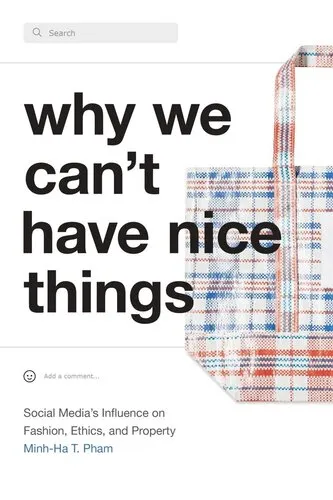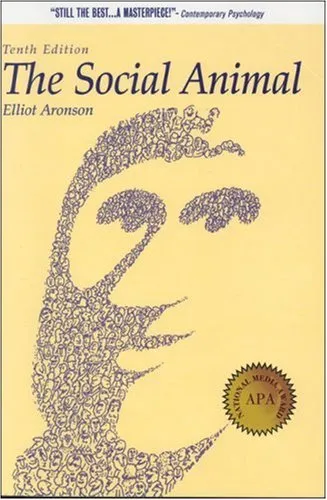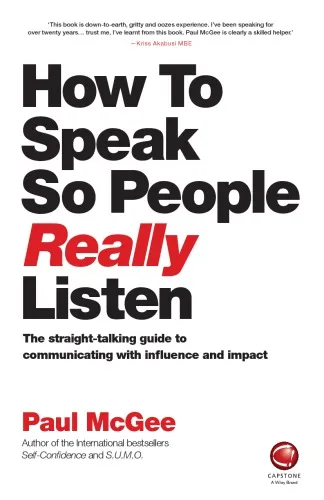Why We Can't Have Nice Things: Social Media’s Influence on Fashion, Ethics, and Property
4.5
بر اساس نظر کاربران

شما میتونید سوالاتتون در باره کتاب رو از هوش مصنوعیش بعد از ورود بپرسید
هر دانلود یا پرسش از هوش مصنوعی 2 امتیاز لازم دارد، برای بدست آوردن امتیاز رایگان، به صفحه ی راهنمای امتیازات سر بزنید و یک سری کار ارزشمند انجام بدینکتاب های مرتبط:
معرفی به کتاب: Why We Can't Have Nice Things: Social Media’s Influence on Fashion, Ethics, and Property
کتاب Why We Can't Have Nice Things نوشته Minh-Ha T. Pham با بررسی رفتارهای اجتماعی و تأثیر رسانههای اجتماعی بر دنیای مد، اخلاق و مالکیت، افقی جدید در شناخت چالشها و فرصتهای معاصر ارائه میدهد. این اثر تحلیلی دقیق از پیچیدگیهای تعامل رسانههای اجتماعی با مقولههایی چون فرهنگ مالکیت فکری، کپیبرداری در صنعت مد، و اخلاق مدرن ارائه میکند. در دنیای پرشتاب دیجیتالی که Social Media نقشی اساسی دارد، این کتاب به طور خاص به دنیای مد و زیباییشناسی میپردازد و سؤالات اساسی در مورد فرهنگ مصرفگرایی، اقتباس، و مالکیت را مطرح میکند.
خلاصهای کامل از کتاب
در Why We Can't Have Nice Things، محقق و نویسنده Minh-Ha T. Pham به بررسی چگونگی پدیدار شدن مشکلات اخلاقی و مالکیت در صنعت مد به واسطه رسانههای اجتماعی میپردازد. نویسنده نگاهی خاص به User-generated content، آثار اقتباسی (appropriation)، و نفوذ برندها در فضاهای دیجیتال دارد. Pham به طور ویژه به موضوعات مرتبط با مالکیت فکری در مد و مشکلات فرهنگی مانند اقتباس فرهنگی و سوءاستفاده بصری پرداخته است.
کتاب از سه منظر کلیدی به موضوع نزدیک میشود: ۱) نحوه عملکرد Social Media در گسترش یا مهار الگوهای سرقت هنری و مالکیت فکری، ۲) نقش پلتفرمهایی مثل Instagram در تقویت زیباییشناسی و تبدیل ایدههای هنری به ابزاری برای سودآوری، و ۳) تأثیرات گستردهتر این مسائل بر جوامع محلی و جهانی. نویسنده همچنین با تحلیل موارد خاص از فشن شوها، برندها و فعالیتهای کاربران آنلاین، مرزهای بین بازیابی خلاقانه و کپیبرداری غیراخلاقی را مورد مطالعه قرار میدهد.
نکات کلیدی
- نقش حیاتی Social Media در شکلگیری ترندهای مد و استفاده از زیبایی بصری.
- بررسی اقتباسهای فرهنگی و مالکیت اخلاقی در دنیای دیجیتال.
- نقد سیاستهای محافظت از مالکیت فکری در صنعت مد.
- شکستن مرزهای اخلاقی بین هنر، سود و کپیبرداری.
جملات معروف از کتاب
"Social Media doesn't just amplify fashion trends; it transforms the very ethics of creativity and ownership."
"In the digital age, nice things aren't just made or bought; they’re co-created, shared, and constantly remixed."
"Cultural appropriation in fashion is a mirror reflecting the deeper inequities of intellectual property."
چرا این کتاب مهم است؟
در عصر دیجیتال، کشمکشها و مرزهای اخلاقی همواره در حال تغییر است. Why We Can't Have Nice Things ما را با دیدگاههایی تازه در مورد مشکلات اساسی که در نقطه تلاقی مد و رسانههای اجتماعی ایستادهاند، آشنا میکند. این کتاب نه تنها به مسائل روزمره مردم و مصرفکنندگان میپردازد، بلکه به سیاستگذاران، پژوهشگران و برندها نیز نگاهی عمیق برای تفکر دوباره در مورد مالکیت فکری و آینده فرهنگ دیجیتال ارائه میدهد.
از رویکرد Pham میتوان برای بازنگری در اخلاقیات و سیاستهای جهانی در دنیای مد و سایر زمینههای خلاقانه بهره برد. اهمیت این کتاب در توانایی آن برای ایجاد بحثهای سازنده در مورد مسئولیتپذیری هنری و فرهنگی به وضوح مشهود است. با تلفیق مطالعهای دقیق، تحلیل انتقادی و تحقیق جامع، این اثر یک منبع قدرتمند برای فهم بیشتر نقش دامنهدار رسانههای اجتماعی در دنیای مدرن است.
Introduction to "Why We Can't Have Nice Things: Social Media’s Influence on Fashion, Ethics, and Property"
"Why We Can't Have Nice Things" by Minh-Ha T. Pham examines the profound impact of social media on the realms of fashion, ethics, and intellectual property. The book dives into the tensions between creativity and capitalism, the influence of digital platforms on cultural production, and the systemic inequities that shape the global fashion economy. Grounded in critical analysis and real-world examples, Pham presents a compelling case for why the internet’s democratizing potential is far more complicated than it seems.
The title itself is a playful yet pointed critique of the mechanisms by which digital media platforms, consumer capitalism, and legal frameworks work together to perpetuate issues like cultural appropriation, fast fashion, and exploitation. For readers interested in the intersection of fashion studies, digital culture, and ethics, this book provides an essential roadmap to understanding the contemporary issues surrounding intellectual property within creative industries.
Detailed Summary of the Book
Minh-Ha T. Pham’s book navigates through several interwoven themes that define the landscape of fashion in a social-media-dominated era. Pham begins by unpacking how platforms like Instagram and TikTok have created a new arena for fashion creativity but also reinforced systemic inequalities. The book highlights how smaller creators often find their designs appropriated by big brands, and how the lack of enforcement of intellectual property rights disproportionately affects marginalized communities and independent designers.
The author connects these issues to larger trends in fast fashion, where the culture of speed and disposability is magnified by social media’s rapid cycle of trends. Pham critiques the ethical shortcomings of the fashion industry, including unjust labor practices and environmental damage, offering deep insight into how digital consumerism perpetuates these dynamics. She carefully dissects the ways legal systems overlook or exacerbate these problems, ultimately raising questions about who truly benefits from the existing frameworks of property and ownership in fashion.
Key Takeaways
- Social media can amplify both opportunity and inequality in the world of fashion design and production.
- Cultural appropriation in fashion has been exacerbated by the ease of access and visibility enabled by digital platforms.
- Global labor inequities are deeply tied to fast fashion, which is fueled by the internet’s obsession with trends and constant consumption.
- The concept of intellectual property in fashion is highly contentious, as it often leaves smaller creators unprotected while favoring larger corporations.
- Ethical consumption in fashion requires systemic changes that go beyond individual actions.
Famous Quotes from the Book
"Social media promised to democratize fashion, but it often ends up consolidating power in the hands of those who already have it."
"The value of 'originality' becomes meaningless in a world where the speed of copying outpaces the speed of recognition."
"Ethical consumption is not about individual purity; it’s about collective accountability both online and offline."
Why This Book Matters
"Why We Can't Have Nice Things" provides a critical lens on the intersecting worlds of fashion, social media, and capitalist exploitation. This work is not just timely, but necessary, in an age where digital platforms shape consumer behavior, economic practices, and cultural narratives. Minh-Ha T. Pham expertly elucidates complex phenomena, making them accessible to both scholars and general readers alike. The book encourages a rethinking of what it means to consume and create ethically in an interconnected digital world.
More broadly, this book calls on readers to confront uncomfortable truths about the role of technology in perpetuating inequities, challenging us to imagine more equitable and sustainable systems. Its relevance extends beyond fashion into the broader realm of intellectual property and cultural production, making it an indispensable resource for anyone interested in these critical issues.
دانلود رایگان مستقیم
شما میتونید سوالاتتون در باره کتاب رو از هوش مصنوعیش بعد از ورود بپرسید
دسترسی به کتابها از طریق پلتفرمهای قانونی و کتابخانههای عمومی نه تنها از حقوق نویسندگان و ناشران حمایت میکند، بلکه به پایداری فرهنگ کتابخوانی نیز کمک میرساند. پیش از دانلود، لحظهای به بررسی این گزینهها فکر کنید.
این کتاب رو در پلتفرم های دیگه ببینید
WorldCat به شما کمک میکنه تا کتاب ها رو در کتابخانه های سراسر دنیا پیدا کنید
امتیازها، نظرات تخصصی و صحبت ها درباره کتاب را در Goodreads ببینید
کتابهای کمیاب یا دست دوم را در AbeBooks پیدا کنید و بخرید
1389
بازدید4.5
امتیاز0
نظر98%
رضایتنظرات:
4.5
بر اساس 0 نظر کاربران
Questions & Answers
Ask questions about this book or help others by answering
No questions yet. Be the first to ask!














